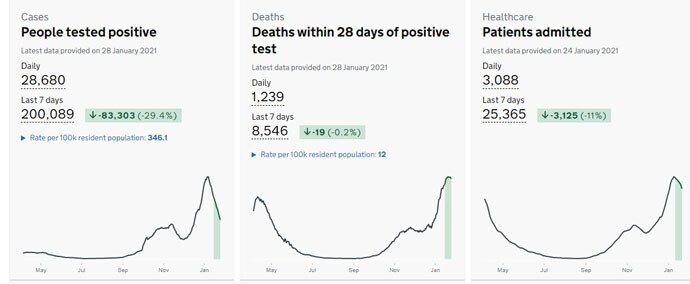These are the UK coronavirus stories you need to know about today.
'No Sharp Drop in Infections'
The latest preprint data from Imperial's REACT study show infections are the highest since testing began last May, and are not falling as fast as they did in the first wave.
- Overall, 1 in 64 people were infected between 6 and 22 January.
- National prevalence was 1.57%, or 157 per 10,000 people infected.
- R is estimated at 0.98 with a range of 0.92 to 1.04.
- Regional prevalence was highest in London at 2.83%.
- Large household sizes, deprived neighbourhoods, and Black and Asian ethnicity were linked to a higher risk of testing positive.
- Healthcare and care home workers, and other key workers, were more likely to test positive compared to other jobs.
The authors write: "Unless the prevalence of infection in the community can be lowered substantially, the extreme pressure on health services will continue over the coming weeks, and possibly months, until the vaccination programme protects sufficient numbers of at-risk individuals."
Imperial's Professor Paul Elliott said: "The number of people infected with the virus is at the highest level that we’ve recorded since we began testing last May.
"We’re not seeing the sharp drop in infections that happened under the first lockdown and if infections aren’t brought down significantly, hospitals won’t be able to cope with the number of people that need critical care. We all need to stay at home wherever possible and help bring the virus under control and protect our already over-stretched health system."
Commenting via the Science Media Centre, Dr Simon Clarke, associate professor in cellular microbiology, University of Reading, said: "Intriguingly, during this time, hospital admissions began to fall around 14 January, which would normally indicate an overall decrease in infections. This apparent contradiction might be because infections were highest in the age groups from 13-24 years, who are least likely to be hospitalised. With that in mind, merely looking at hospital admission numbers will not be a reliable way of gauging the risk to society of lifting restrictions and opening schools."
Latest Data
Latest Test and Trace performance data for England show 93.8% of in-person test results were returned the day after testing, compared with 84.8% the week before.
Between 14 and 20 January, 274,898 people tested positive for COVID-19 at least once. That's 17% lower than the previous week.
NHS Providers said latest NHS England weekly performance data show hospitals remain under intense pressure.
Chief Executive Chris Hopson said: "It is extremely impressive to see how trusts are continuing to expand the capacity of intensive care units, with more critical care beds made available this week. This reflects how staff are continuing to flex their capacity to treat the sickest patients requiring ventilation, with these beds occupied at record levels – 87.1% nationally.
"More people were taken to hospital by ambulance this week. Reducing handover delays remains a priority for trusts, with 13% delayed by over 30 minutes, with each of these meaning a crew cannot respond rapidly to another emergency call in the community."
Public Health England surveillance data show COVID-19 case rates continued to decline between 18 and 24 January, "while there was indication that hospital and ICU admissions began to stabilise or decline slightly".
In today's daily data another 28,680 UK positive tests were reported and 1239 deaths.
Another 3088 COVID-19 patients were admitted to hospital. The total is now 36,931, and 3937 ventilator beds are in use.

As of yesterday, 7.4m people have had a first dose of a COVID-19 vaccine, and 476,298 a second dose.
BAME A&E Attendances Down
People from BAME backgrounds in England were less likely to attend emergency departments than White patients during the first lockdown, according to a study published in The Lancet Regional Health – Europe.
Overall A&E attendances were down 51% last March and April and the biggest falls were among patients of:
- Chinese background (74.5%)
- Bangladeshi background (75.3%)
- Indian background (64.9%)
- Pakistani background (71.8%)
- Black African backgrounds (63.5%)
Study lead, Steven Wyatt, head of strategic analytics, NHS Strategy Unit, said: "The fact that people from the Black and Asian communities were less likely to attend hospital is worrying. People are weighing up the risk of catching COVID if they attend A&E against the risk of leaving health problems untreated if they do not. We need to make sure that people have the information and support they need to make the right call."
'Weaponising' COVID-19
The Police Federation of England and Wales said COVID-19 is being "weaponised" against officers with 32% threatened by someone thought to be infected who said they'd cough or breath on them, and 24% who'd actually been attacked.
National Chair John Apter said the police "must be given all the protection they need to protect themselves and this includes being prioritised for the COVID vaccine. We have had enough of the warm words - we now need action".
Self-isolation Support
There should be more of a priority on helping people self-isolate, experts argue in The BMJ.
Dr Muge Cevik, University of St Andrews and colleagues say the focus should be on those in high exposure occupations, overcrowded housing, and without a home.
Survey data has suggested lower adherence among men, younger people, key workers, those living with dependent children, and lower socioeconomic groups.
The authors point to successful US schemes involving free food deliveries, hotel accomodation, and dog walking.
"These interventions have led to high rates of test uptake, number of contacts identified, and adherence to self-isolation, contributing to reducing total household and community transmission," they write.
Body Temperature
Age should be taken into account in UK guidance on body temperature and COVID-19 to avoid cases being missed, according to a new preprint study by King’s College London researchers.
Basal body temperature was lower in older people and those with a lower BMI.
Older people with COVID-19 were also less likely to have a fever reaching 37.8C or more.
This could drop by 1% with every additional year of age.
Lead researcher Dr Claire Steves said: "Recognising 37.4C as the fever threshold for people over 65 could make a big difference to diagnosing the disease in a timely way, stopping its spread, and getting the right treatment."
COVID Protester Sought by Police
Police are seeking a man after a group tried to remove a family member who was a COVID-19 patient from East Surrey Hospital last week.
The protesters gained access to a critical care ward and were abusive towards staff.
Police attended and gave fines for breaching COVID-19 restrictions and issued a breach of the peace warning.
Tobe Hayden Leigh, 45, from Maidstone in Kent, is also wanted over social media posts making abusive comments towards hospital staff.

Detective Chief Inspector Kimball Edey said: “We would like to speak to Hayden Leigh in connection with this incident, and the escalating abusive and threatening comments being made towards hospital staff on social media. These comments are extremely concerning, and are obviously causing considerable distress for those who are being targeted.
"The staff at the hospital, as are all NHS workers, are trying to care for desperately ill people in extremely challenging circumstances, and to be targeted and abused on social media in this way is simply unacceptable.”
Hayden Leigh was in close contact with a seriously ill COVID-19 patient and may now have the virus himself.
MP's Comments
Meanwhile, there's been criticism of senior Conservative MP Sir Desmond Swayne for urging anti-vaccination campaigners to continue their fight against coronavirus restrictions.
Cabinet Office Minister Michael Gove told Sky News: "Sir Desmond is wrong" and is "completely out of order".
He added: "I would hope that he issues a full and complete retraction and apology for what he said. It's unacceptable."
Sir Desmond later told the TV station his comments to anti-vaccination groups on data supporting the November lockdown "were perfectly legitimate at the time".
He said he regretted the "fuss" his comments caused and said COVID deniers are "nutty".
Lockdown Health
The Scottish Health Survey 2020 based on 1920 phone interviews in August and September has highlighted lockdown's impact on mental health:
- A probable psychiatric disorder was suggested for 22% of respondents
- 11% reported two or more symptoms of depression
- 13% reported two or more symptoms of anxiety
- 5% reported feeling lonely often or all of the time
- 15% reported feeling lonely some of the time
There were also lifestyle and behaviour changes since before the March lockdown:
- 39% reported weight gain
- 18% reported weight reduction
- 24% reported an increase in alcohol consumption days, and 17% reported a decrease
- 12% reported an increase in their alcohol intake on a typical day, and 18% reported a decrease
- 36% of smokers smoked more, 55% reported no change
Around 1 in 5 (19%) reported providing regular unpaid care, and this was more common among women (23%) than men (14%).
Vaccination News
Germany's vaccine committee says the Oxford/AstraZeneca jab should only be given to under-65s. "There are currently insufficient data available to assess the vaccine efficacy from 65 years of age," the committee said in a statement.
Professor Andrew Pollard, director of the Oxford Vaccine Group, pointed out a section from the MHRA's assessment: "There is limited information available on efficacy in participants aged 65 or over, although there is nothing to suggest lack of protection."
An AstraZeneca spokesperson said: "Reports that the AstraZeneca/Oxford vaccine efficacy is low in adults over 65 years is not an accurate reflection of the totality of the data. The latest analyses support efficacy in this age group, which we expect to be published by the EMA [European Medicines Agency] in the coming days. The most recent Lancet publication has demonstrated that older adults showed strong immune responses to the vaccine, with 100% of older adults generating spike-specific antibodies after the second dose."
The EMA is due to announce its decision on the vaccine tomorrow.
Valneva has started commercial manufacturing of its COVID-19 vaccine candidate at its Scottish plant in Livingston. It could produce up to 60 million jabs by the end of the year if regulators approved it.
The UK has ordered 60 million doses with an option to buy another 130 million if it is safe, effective, and suitable.
Preprint University of Oxford OpenSAFELY data show big differences in vaccination numbers of over-80s by ethnicity:
- White 42.5%
- Black 20.5%,
- South Asian 29.5%
GPs can deliver flu jabs year in, year out, but COVID-19 vaccination centre rules aren't necessarily recognising this experience.
No 'Coronababy' Boom
Sky News reported that predictions of a 'coronababies' baby boom were wrong.
Figures from NHS trusts in England under a Freedom of Information request show 12-week scans carried out in 2020 fell by 4% compared with 2019.
Birte Harlev-Lam from the Royal College of Midwives told the TV station: "When there are big disasters, it does seem people take comfort in each other and we generally see a bit of a baby boom.
"I think there was a thought, very early on, this might happen again because it was a scary time with COVID."
See more global coronavirus updates in Medscape’s Coronavirus Resource Centre.




